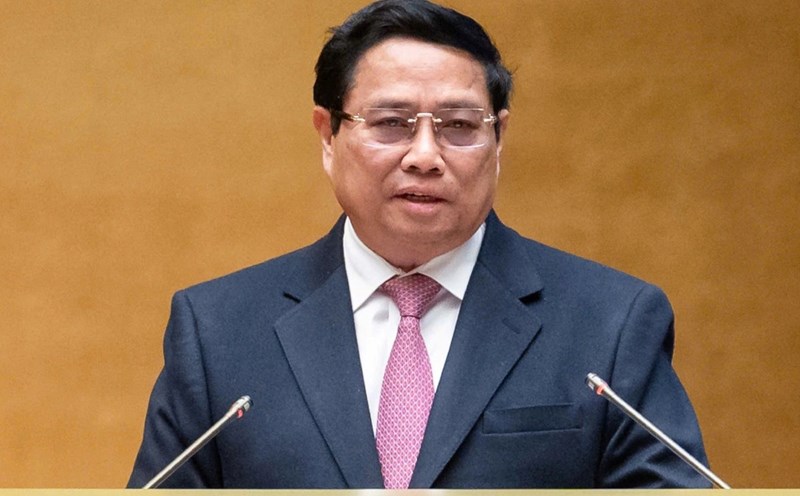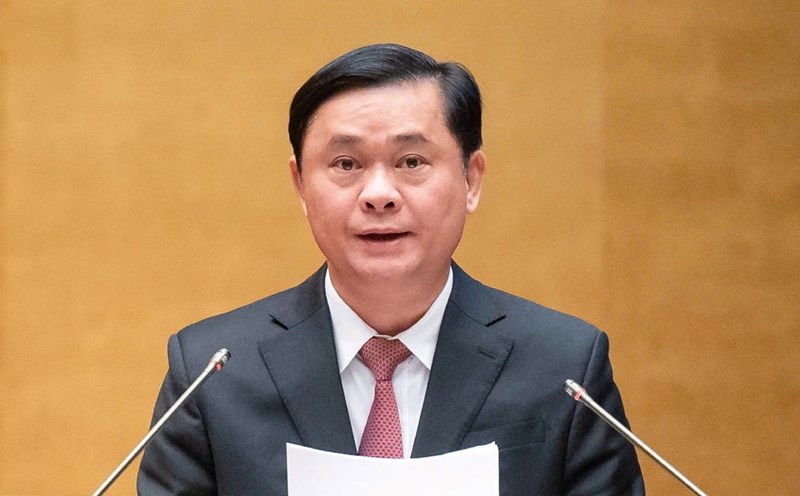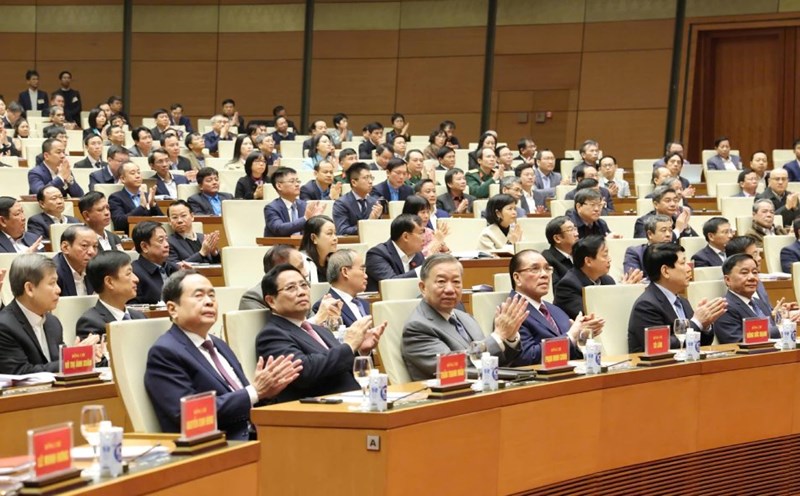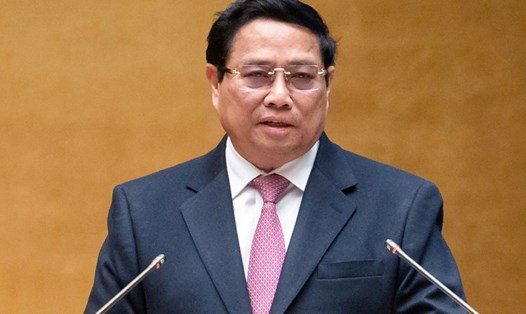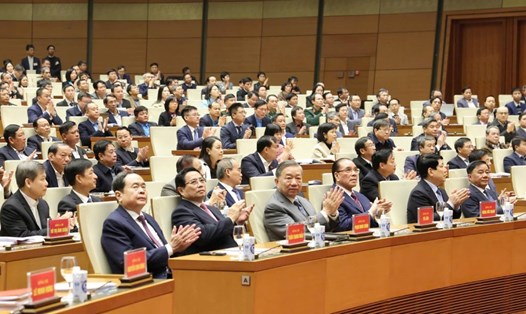On May 18, 1963, at the historic Ba Dinh Hall, the First Congress of the Vietnam Association for the Dissemination of Science and Technology was held, marking an important event in the history of science and technology in our country. In his speech at the Congress, beloved President Ho Chi Minh emphasized the importance of disseminating science and technology, considering it a driving force for building and developing the country. He advised: "Science must be associated with production, serving the people." This event laid the foundation for the steps of developing scientific applications to serve the cause of industrialization and modernization of the country.
More than six decades later, today, the second National Conference is held, with a new scale and stature, reflecting the determination of the entire political system and the country in promoting the development of science, technology, innovation and digital transformation.
As we know, science and technology are the key drivers for the miraculous economic growth of many countries. The successful lessons from the United States, China, Germany, Japan and recently India, Ireland, South Korea and Singapore have demonstrated the role of science and technology. These countries have utilized technology to transform their economic models, promote increased labor productivity and enhance global competitiveness.
With the goal of becoming a modern industrial country by 2030 and a developed, high-income country by 2045, we must consider science, technology, innovation and digital transformation as key driving forces. This is the "golden key", the vital factor to overcome the middle-income trap and the risk of falling behind, while realizing the aspiration of our nation to be strong and prosperous. However, developing science, technology and digital transformation are only "important means" to achieve the goal. Breakthroughs and innovations are the magical factors to create miracles, because breakthroughs and innovations create revolutionary breakthroughs, overcome current barriers and limits to achieve outstanding and outstanding results. Breakthroughs are always new, effective, beyond limits, and have a great impact (For example: In technology: the advent of smartphones has changed the way people communicate and work; In economics: business models based on digital platforms such as Uber, Airbnb, e-commerce... are breakthroughs for traditional industries; Gene editing technology (CRISPR) is a major breakthrough in biology, medicine and agriculture; In society, reforms in education, health care, literature, arts and management policies are bringing about huge changes in the quality of human life).
Resolution 57 of the Politburo has pointed out strategic directions and has been widely agreed upon by cadres, party members, scientists, and the business community at home and abroad, considering it a “contract 10” in the field of science and technology. This support demonstrates the nation’s strong desire for development and determination to rise up. Today’s conference demonstrates the sense of responsibility and consensus of the entire Party and political system. With careful preparation, we have strong belief that breakthroughs in science, technology, innovation, and digital transformation will be the key to taking the country further on the path to realizing its development aspirations.
Dear comrades and delegates,
Our Party and State always consider science and technology as the decisive factor and foundation for the sustainable development of the country. Since the 4th Congress, science and technology have been identified as a revolution, and up to now, as a top national policy. Many important Resolutions such as Resolution 20, Resolution 52, Resolution 36 have been issued, bringing positive results, contributing to the development of the country as it is today. However, looking at it in a comprehensive, serious and objective way, the results of implementing the Central Resolutions have not achieved the set goals, have not been as expected, and have not met the development requirements. There are still many shortcomings, limitations, barriers, and bottlenecks that are hindering the development of science and technology as stated in the report, from institutions, mechanisms, policies, laws, to resources and means (scientists spend too much time, about 50% of their time and effort on procedures; research topics have no breakthroughs, results cannot be measured; resources for science and technology are limited, our budget for research and development is less than 0.7% of GDP, while the average of developed countries is 2%, some countries are 5%; we are not bold enough to accept risks in research, we cannot commercialize products, in many cases, doing research is a form of "disguised economics"...). The main reason for the lack of success of the Central Resolutions lies in the implementation organization. Resolution 57 does not replace previous resolutions but can be considered a "Resolution to liberate scientific thinking", "Resolution to implement Resolutions", "Resolution of action" with very specific goals, innovating thinking and working methods, aiming to realize policies, remove barriers, liberate capacity to promote breakthroughs in science and technology development, innovation and digital transformation, creating a foundation for strong development of the country in the new period.
How to effectively and promptly implement the Resolution; all levels, sectors and localities must roll up their sleeves and get to work without delay. The policies and solutions contained therein must be quickly institutionalized and priority given to allocating sufficient resources for implementation.
With that in mind, I propose that we continue to research, perfect and deepen the following viewpoints and orientations:
First of all, about the viewpoint: Always thoroughly consider investment in science - technology, innovation and digital transformation as a long-term strategy, accepting delays and risks in implementation. Consider this as an investment, and investment means accepting both wins and losses. Consider data as a new resource, the "air and light" of the new era, and new means of production; digital transformation is a tool to innovate production methods, business, and productive forces. Innovation is the "magic wand" to achieve sustainable prosperity, with scientists holding the central position.
Breakthroughs must be made in both natural sciences and social sciences, which are endless spaces, with many wildernesses and many opportunities for intellectuals, scientists and workers to turn "stones into rice". But now we should focus on the following areas: Physics and energy (quantum mechanics to have applied products such as microprocessors, lasers, nano...); information and communication technology; medicine and biology (DNA, Genes, Vaccines, 3D...); space technology; Materials, energy and environmental technology (renewable energy, Lithium-Ion batteries, carbon capture and storage...); inventions in life (3D, robots and automation, virtual reality technology - VR and augmented reality - AR); Blockchain technology, Internet of Things (IoT); geographic information; digital cultural analysis; online education and training... It is necessary to shift from applying and mastering technology to building breakthrough creative capacity, taking advantage of opportunities from the Industrial Revolution 4.0 to "take shortcuts, get ahead" and master the future. The implementation of the Resolution must focus on practical issues that the country is demanding, the market and the economy need. Research products must be commercialized and copyrighted.
Regarding action, it is necessary to clarify what the State does? What do businesses do? What do intellectuals and scientists do? What do the people do? How do they benefit? The State needs to focus on four things: (1) Perfecting institutions and laws to make breakthroughs and develop, (2) Building an infrastructure system to serve breakthroughs, (3) Creating a rich and intelligent human resource with enough capacity to make breakthroughs, (4) Ensuring security, safety of information data, secrets, know-how, ensuring intellectual property rights, protecting national sovereignty, and developing independently.
In that spirit, I propose and emphasize 8 tasks and solutions, especially breakthrough tasks:
The first is to unify awareness and action: Identifying the development of science and technology, innovation and digital transformation as strategic tasks of the entire Party, people and army. The Central Committee has set an example in action, with the accompanying Action Program being thoroughly implemented today. Party committees and authorities at all levels need to concretize the Resolution with practical plans, taking implementation results as criteria for emulation and reward assessment. All tasks will be monitored and evaluated regularly; good performance will be rewarded, slow performance or violations will be criticized and handled. Weak and irresponsible leaders will be replaced immediately, not letting the country miss out on development opportunities. Party committees, authorities and units need to make specific plans, closely following the goals of Resolution 57, with clear tasks, specific assignments, completion time and measurable results. Right in 2025, it is necessary to select and solve very fundamental problems, creating a foundation for the 2026-2030 period, creating a boost for new labor productivity, and creating trust for society.
Second, it is necessary to urgently improve institutions and policies: in 2025, as soon as possible, we must complete the amendment, supplement or promulgate new legal regulations, policy mechanisms, remove all bottlenecks and barriers to develop science, technology, innovation and digital transformation, unleash creativity to the maximum, encourage daring to think, daring to do, daring to take responsibility (which regulations need to be eliminated, then eliminate them, which laws need to be amended, then amend them, synchronously, uniformly, with an open spirit, one content is only regulated in one law. There needs to be new thinking, approaches in amending the Law on Information Technology, the Law on Science and Technology, the Law on State Budget, the Law on Management and Use of Public Assets and the Law on Civil Servants to synchronize relevant legal regulations). We encourage dynamic and creative people who dare to think and dare to do first of all by the provisions of the law, creating space for managers to decide and take responsibility.
The Politburo has directed the innovation of the law-making process, ensuring flexibility and efficiency, and this spirit will be institutionalized in the Law amending the Law on Promulgation of Legal Documents, which is expected to be passed by the National Assembly soon. The Government Party Committee needs to coordinate with the National Assembly Party Delegation to direct the timely implementation of the development of 27 laws and 19 decrees in 2025, ensuring the institutionalization of Resolution 57 of the Politburo and the early issuance of guiding documents so that new regulations can soon be put into practice. Institutional improvement must go hand in hand with effective implementation, with a strict monitoring and evaluation mechanism, especially for the team of implementing officials. Immediately eliminate the situation of "spreading carpets above, spreading nails below" and eliminate the mindset of tenure, jealousy, or egalitarianism.
Third, urgently reorganize the science and technology apparatus: In the first quarter of 2025, complete the reorganization of science and technology organizations; focus on key investments to develop strong research organizations. Have a specific plan to build high-quality human resources, especially science and technology talents. Implement breakthrough solutions to attract leading technology corporations, attract Vietnamese and foreign technology talents to work. Procedures related to this issue must be more open, even highly competitive compared to other countries to attract. Consider removing business conditions that are no longer suitable to the new requirements of Resolution 57. The State can select a number of institutes or schools to pilot and invite outside experts to be leaders, especially from the overseas Vietnamese community, those who understand Vietnamese culture, have grown up in developed countries, are knowledgeable in expertise and management, and have extensive international connections. Previously, people did not dare to return because we were not really willing, there were many administrative barriers and regulations, making it very difficult to operate. Now everything will be much smoother.
Calculate the formation of a Chief Architect or General Engineer mechanism for the implementation of large projects on science, technology and digital transformation of an interdisciplinary nature; Establish a National Institute for standards and inspection of research, testing, evaluation and inspection of products and services.
The State facilitates the establishment of private research institutes, supports procedures, encourages them with taxes and credits, invites foreign experts to work, and creates all conditions for smooth operations. (Recently, a number of large technology group projects intended to invest in Vietnam, but the procedures were too cumbersome, entangled in many things, and took years to implement.) This issue must be reviewed for strong reform as early as 2025.
Fourth, prioritize budget allocation for science and technology to be worthy of being a breakthrough national policy: Allocate budget for science and technology, R&D, establish science and technology funds, encourage the formation of venture capital funds, angel funds, start-up funds, innovation funds, etc. Research the mechanism for the "public investment - private management" model, ensuring that scientists have the right to be proactive in research and technology application. In 2025, the first year of implementing Resolution 57, the Government needs to innovate the budget allocation plan for science, technology development, innovation and national digital transformation. It is recommended that the Government allocate at least 3% of the budget to carry out this task and continue to increase the spending ratio for science and technology to 2% of GDP in the next 5 years. Announce this policy soon and guide the procedures for its smooth implementation. Review and adjust projects to ensure compliance with Resolution 57, avoid waste, focus on effective and targeted investment. At the same time, thoroughly reform the process of allocating, managing and settling funds, eliminating the "ask - give" mechanism and cumbersome procedures to optimize resources and encourage creativity.
Fifth, rapidly develop high-quality human resources: Issue a mechanism to attract talents in general, especially scientific and technological talents, overseas Vietnamese talents and international experts, with attractive policies on nationality, income, housing and working environment. Related procedures must be open, attractive and internationally competitive. Build a network of domestic and international experts, regularly report results to the Central Steering Committee. Promote the movement to honor talents and creativity, arouse the spirit of patriotism and dedication of scientists. Continue to maintain the lifelong learning movement, reform the education and training system, focusing on post-graduate, university and vocational training.
Sixth, increase investment in technology infrastructure, including digital technology: Prioritize the construction and completion of infrastructure as stated in Resolution 57. In particular, it is necessary to prepare energy infrastructure for the next 5-10 years, focusing on clean energy, ensuring sufficient energy for development through specific actions. Optimize and upgrade digital infrastructure, build 5G base stations, expand broadband Internet and fiber optic coverage. Develop a high-speed low-altitude satellite system. Build a National Data Center, implement the Data Law and a data exchange in 2025. In 2025, the Government Party Committee needs to direct the review and supplementation of the VIII Power Plan, effectively exploit potentials such as wind power, solar power, deploy the construction of nuclear power plants, and ensure sustainable power sources. At the same time, it is necessary to effectively manage, exploit and protect minerals, especially rare earths, to serve the development of national science and technology.
Seventh, focus on spearheads in industries with advantages and potential, avoid spreading: It is necessary to prioritize resources for a number of economic sectors with advantages and potential for development, avoid spreading, inefficiency and waste, including technological solutions for practical problems of the country such as rational and economical use of resources, environmental protection, climate change adaptation, high-tech agriculture, food security, human health science, and Industry 4.0. Focus on promoting "spearheads" of digital transformation, especially implementing Project 06 and building a National Data Center. In 2025, ensure that 100% of administrative procedures related to enterprises are carried out online, smoothly and effectively; 100% of administrative procedures are not limited by provincial administrative boundaries. Accelerate the connection and sharing of important data in areas such as population, justice, education, banking, tax, insurance, enterprises, land, vehicles, etc. The national data center must be completed with “correct, sufficient, clean, and live” data, leading comprehensive digital transformation, creating a foundation for the development of the digital economy and modern production forces in the 2026-2030 period, meeting the goals of Resolution 57.
Eighth is to promote cooperation and utilize international knowledge: Promote research cooperation and technology transfer with advanced countries, especially in areas such as artificial intelligence, biotechnology, semiconductors and renewable energy. Actively participate in building international standards, first of all in the ASEAN region, through initiatives such as the Hanoi Convention. We must know how to "stand on the shoulders of giants". Attract investment from large technology corporations, create opportunities for Vietnamese enterprises to participate in the global value chain, encourage technology transfer, improve the capacity to learn, absorb, master and improve the world's knowledge and technology.
Dear comrades and delegates,
The country is facing a great opportunity to rise up, but the challenges are also enormous. We must be determined to carry out the revolution of science, technology, innovation and digital transformation, not to miss the opportunity again. I call on the entire Party, the entire people and the entire army to unite, be creative, successfully carry out the tasks, quickly put Resolution 57 into practice, and build a peaceful, unified, independent, democratic and prosperous Vietnam, as wished by President Ho Chi Minh.
Developing science, technology, innovation and digital transformation is not just a choice, but a way of survival. Leaders at all levels need to consider this a key political task; scientists and businesses should contribute and be creative; people need to accompany, learn and improve their digital skills.
Resolution 57 has removed barriers, overcome bottlenecks and created a breakthrough mechanism to unleash creativity, resources, promote science and technology development and national digital transformation. With a solid political and legal foundation and high consensus from the entire Party, people and intellectuals, I believe that the Resolution will create a breakthrough, contributing to socio-economic development and ensuring national defense and security, bringing the country to continue its sustainable development.
On the occasion of the New Year 2025 and the Spring of At Ty, I would like to wish all leaders, former leaders, intellectuals, scientists, workers, comrades and compatriots good health, happiness and success. I wish our country a new year filled with confidence, spirit and new victories.
Thank you very much.

